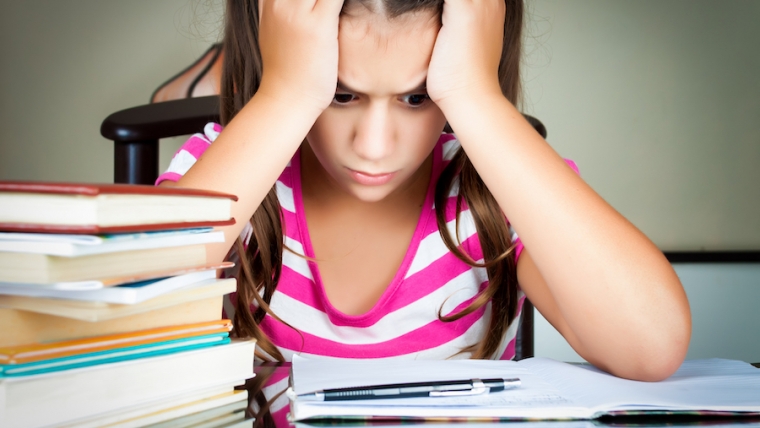Ways to Recognize if Your Child Is Being Bullied
Aisha Pope, LCSW
Welcome to October. By now, all of our kids are back in school, and our (hectic!) routines are becoming second nature again after the initial shock of the end of summer. As we sent or dropped our kids off this morning, the emotions they approached the day with are as varied as the hair styles we sent them with. Some of our kids were excited, some were nervous, some were determined, some were indifferent (or pretending to be), and more than a few were downright terrified. Of those that were terrified, many of them were students afraid to face bullies. According to a 2007 poll, California is the worst state to live in if you want to avoid bullies. New York, Illinois, Pennsylvania, and Washington complete the top 5.
As the parent of a hyper, rambunctious, intelligent, funny, and very quirky child in the public school system in California, my excitement about the joys of school is tempered by my anxieties about the seriousness of bullying in schools today. I used to think I didn’t have to worry about this until middle school, but when a 1st grader recently told me that she had to be a “slave for a week” in order to be allowed to play with the group of friends she wanted to play with, I realized that my own first grader may be at risk. Our kids are remarkably good at hiding things they don’t want us to see, and being bullied is often one of those things.
Here are some signs to look out for that may mean your child is being bullied:
- Aggressive pretend play – often times with younger kids their play is a window into their world. Be alert for aggression or bullying themes in pretend play and ask them to talk with you about it.
- Bullying others – bullying can be (not always) contagious. It is not uncommon for kids who are being bullied at school to bully younger siblings, cousins, or neighborhood friends.
- Mood changes – look out for symptoms of increased nervousness, sadness, irritability, and anger. Also, you may notice that your outgoing child is a bit shyer, or your talkative child may be more quiet.
- Isolation – children who are bullied may spend more time alone, and may not seem to enjoy doing things they used to enjoy doing. Older kids may start pulling out of extracurricular activities and avoid social events.
- Disliking school – many children complain about going to school, but bullied children may be particularly avoidant or fearful. Also look for changes in academic performance.
- Changes in eating or sleeping habits – the key here is change . Whether they start eating more or less isn’t important. Also watch for sleeping too much, difficulty falling or staying asleep, or troubling dreams.
- Damaged or missing clothing or property – some damage or loss of property is par for the course, but if this is happening frequently, or if your child’s explanations don’t seem plausible, ask more questions.
- Increased physical complaints – sometimes when kids are being bullied they fake illnesses to avoid going to school. Also, many children internalize feelings of depression, fear, anger, or anxiety, and those feelings come out in the form of headaches, stomachaches, and other physical symptoms.
- Change in style of dress – you may notice increased covering up that is not appropriate to the weather (which could indicate hiding injuries, or concerns about body image among other things) or desperate attempts to dress in a way that helps them fit in. Some level of this is normal, of course, but parents should be alert to times when this seems excessive.
Bully Smart Parenting Tips
- Have regular family meetings – kids who are accustomed to talking and problem solving with their parents may have an easier time coming to their parents when they are in trouble.
- Keep in touch with teachers – checking in with your child’s teacher(s) on a regular basis makes it more likely that they feel comfortable coming to you with their concerns.
- Know your kid’s friends and their parents – this sometimes adds an extra layer of protection against bullying. When children are not only accountable to each other, but to each other’s parents and their own, they may think twice about bullying.
- Monitor your child’s use of social media – cyber-bullying is the fastest growing form of bullying. If your children have facebook, twitter, or myspace, you should too, and be their “friend” or “follower” so that you have access to anything public on those pages. Let them know you reserve the right to have access to the private goings on on those pages if you have concerns.
- Ask Anything Journal – Amy Lang, author of Birds & Bees and Kids has also published an “Ask Anything Journal.” Buy one or create your own and allow your kids to ask or comment on anything in this journal for you to view and respond to. (this is not the same as their personal journal)
- Don’t be a bully – if you find out that your child is being bullied, be calm about how you respond to this information. If you fly off the handle and put your child in the position to need to protect you (hide things from you so you don’t get upset) or protect themselves (hide things from you so you don’t act hastily and make the situation worse) then they are less likely to share with you.
- Get others involved – if you find out your child is being bullied, get others involved ASAP. Teachers, administrators, and school counselors may be your first points of contact. This is also where knowing your kid’s friend’s parents comes in handy too. If you have some familiarity with the parent of a child that’s bullying your child you may be able to talk to them in a less emotional solution focused way to help your children probem solve together. Other parents may also be good carriers of information. What your child may be afraid to tell you as the target of bullying, their friends may tell their parents.
- Get professional help – The effects of being bullied often reach far past the period in time that the bullying is happening. Many children suffer with low self-esteem, problems managing their anger, poor self – image, and more after facing bullies. A therapist may be helpful to parents and children to learn how to manage their feelings and responses to bullying.





